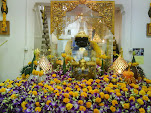Death and the impermanence of life
In the teaching of the Buddha, all of us will pass away eventually as a part in the natural process of birth, old-age and death and that we should always keep in mind the impermanence of life. The life that we all cherish and wish to hold on.
To Buddhism, however, death is not the end of life, it is merely the end of the body we inhabit in this life, but our spirit will still remain and seek out through the need of attachment, attachment to a new body and new life. Where they will be born is a result of the past and the accumulation of positive and negative action, and the resultant karma (cause and effect) is a result of ones past actions.
This would lead to the person to be reborn in one of 6 realms which are; heaven, human beings, Asura, hungry ghost, animal and hell. Realms, according to the severity of ones karmic actions, Buddhists believe however, none of these places are permanent and one does not remain in any place indefinitely. So we can say that in Buddhism, life does not end, merely goes on in other forms that are the result of accumulated karma. Buddhism is a belief that emphasizes the impermanence of lives, including all those beyond the present life. With this in mind we should not fear death as it will lead to rebirth.
The fear of death stemmed from the fear of cease to be existent and losing ones identity and foothold in the world. We see our death coming long before its arrival, we notice impermanence in the changes we see around us and to us in the arrival of aging and the suffering due to losing our youth. Once we were strong and beautiful and as we age, as we approach our final moments of life we realize how fleeting such a comfortable place actually was.
Grieving
It is natural to grieve the loss of family members and others we knew, as we adjust to living without their presence and missing them as part of our lives. The death of a loved one, or even someone we were not close to, is terribly painful event, as time goes on and the people we know pass away along the journey of life, we are reminded of our own inevitable ends in waiting and everything is a blip of transience and impermanent.
At a certain moment, the world seems suddenly so empty and the sense of desperation appears to be eternity. The greater the element of grief and personal loss one tends to feel sorry for oneself.
Some of us may have heard the story of the women who came to the Buddha in great anguish, carrying her dead child pleading him to bring the child back to life. The Buddha said Bring to me a mustard seed from any household where no-one had ever died and I will fulfill your wish. The woman's attempt to search for such seed from houses were in vain and of course she could not find any household in which no-one had ever died and suddenly she realized the universality of death.
Sunday, 8 November 2009
Subscribe to:
Post Comments (Atom)

No comments:
Post a Comment